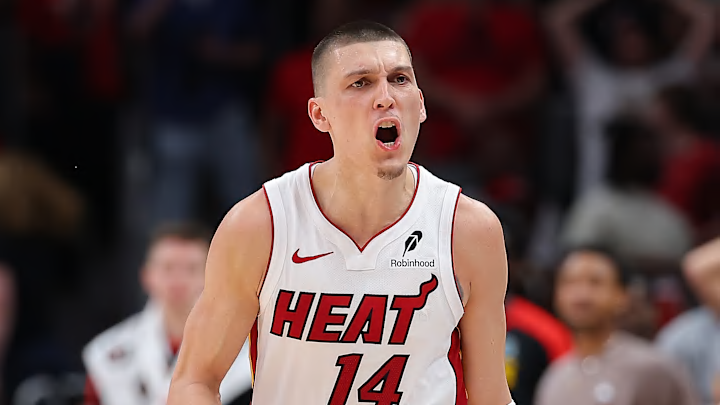The Nikola Jovic extension is first and foremost evidence of how much the Miami Heat value their 22-year-old stretch big man. After that, it might just be a sign that they are prepared to double-down on their commitment to Tyler Herro.
Miami’s All-Star guard is eligible for a three-year extension worth up to $150 million. Conventional wisdom has long suggested the team would bypass making a deal this fall, and re-evaluate the relationship next summer, when he’ll be entering the final year of his contract.
Yet, Herro recently said that he expects to sign an extension, per the Miami Herald’s Anthony Chiang. This flies in the face of consensus. As the Jovic deal proves, though, it may also be a harbinger of what’s to come.
The Heat aren’t phased by adding long-term money
Much of the equivocation over Herro’s future stems from the Heat’s apparent interest in preserving cap space. They were on track for more than $90 million worth of spending power over the 2027 offseason, when Herro’s current deal comes off the books.
Emphasis on were.
Jovic’s extension adds more than $15 million to Miami’s ledger in 2027. A lot can happen between now and then. Jovic himself could be traded for cap relief, and even if he’s not, the Heat can still carve out a $70 million offseason slush fund.
Except, this presumes Miami doesn’t add any other money beyond the 2026-27 campaign. That doesn’t require just leaving Herro without a new deal. It basically mandates they get rid of Norman Powell (expiring this season), and Andrew Wiggins (2026-27 player option). This says nothing of potentially wanting to keep Davion Mitchell (2027 free agent), or extending Jaime Jaquez Jr. (eligible next summer).
Maybe the Heat are willing to roll the dice and lean into short-term contracts and placeholder personnel. Jovic’s contract suggests they’re not.
That’s the right call. Superstars, as we’ve noted time and again, aren’t changing teams via free agency anymore. Trades are the vehicle through which they swap jerseys. While cap space is useful in those situations, draft picks, prospects, and desirable matching salary are all more valuable.
Tyler Herro is more likely to get paid
Knowing the Heat aren’t obsessed over maintaining squeaky clean books for the summer of 2027 increases the chances that Herro signs an extension of his own. His value is complicated, both internally and externally, but he is so far Miami’s best offensive player, and remains young enough to get better.
Letting him reach free agency in 2027 poses all sorts of risk. They could be left deciding between losing him for nothing, or matching more expensive longer-term offers they wouldn’t need to lock him down now.
Of course, the Jovic extension also happens to be a deal that should age extremely well as a trade asset. His signing could be borne from an unexpectedly team-friendly price point.
Even so, the sheer willingness to tack on long-term money qualifies as a departure from what everyone thought the Heat were planning. That’s good news for Tyler Herro—and perhaps Miami, too.
